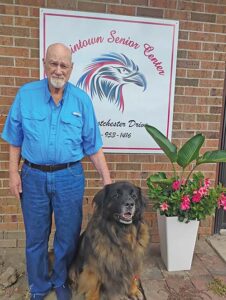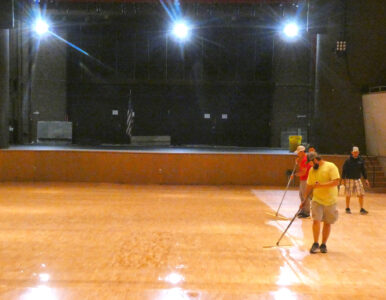Opening their hearts, minds
Trip to Poland provides locals with deeper understanding of the Holocaust

071425...R JCC POLAND 1...Youngstown...07-14-25...L-R: Christen Jones, W. Middlesex Jr./Sr. High School teacher, Melissa Bateman, Youngstown Area Jewish Federation Director of Community Engagement, Brian Bugos, Newton Falls HS teacher, Jodi West, Akiva Academy teacher, and Ryan Kish, Campbell Memorial HS teacher...At the Holocaust Memorial outside the Jewish Community Center...by R. Michael Semple
YOUNGSTOWN — It’s easy to reflexively and statistically view those who died in the Holocaust during World War II as tragic victims, but Christen Jones desires for her students and others to see them far more holistically.
“I really want to teach my students to connect to specific people. I want them to see their faces,” Jones, an 11th- and 12th-grade English teacher at West Middlesex Junior and Senior High School in Pennsylvania, said Monday at the Jewish Community Center of Youngstown.
Fueling such a desire for the 20-year teacher is her eight-day immersive, educational and highly emotional trip last month to Poland, where she and several other area educators visited infamous Holocaust sites and other locations. The teachers learned more about the history and culture of that dark period in history and hope to use their knowledge to enrich their classroom curriculums while honoring many of those whose lives were tragically cut short.
Their eight-day European journey was courtesy of Classrooms without Borders, an organization that seeks to open minds and hearts via learning experiences designed to empower educators and transform education while fighting anti-Semitism and other types of bigotry. CWB operates under five core tenets: education, collaboration, respect, understanding the roots of the Holocaust and studying Israel and how its existence foments unwanted anti-Semitism, according to the organization’s website.
Before their lives were snatched from them, many of those who died in the concentration camps and gas chambers were regular people with everyday interests and meaningful lives, not unlike lots of her students, as well as people who contributed to their communities, Jones said.
The trip had countless moving and emotional moments for her, one of which was the sharp juxtaposition she saw between the beauty of butterflies, pine trees and flowers in the bucolic countryside, and the horrors of the nearby Treblinka death camp, which was established in November 1941 as part of Operation Reinhard during the German occupation of Poland. Between July 1942 and September 1943, an estimated 925,000 Jews were murdered at Treblinka, according to the Holocaust Encyclopedia website.
In addition, the educators’ itinerary included the Warsaw Ghetto, the Polish History Museum, the Warsaw Jewish Cemetery and Auschwitz, also known as Auschwitz-Birkenau, a complex of more than 40 concentration and extermination camps Nazi Germany established in 1940. More than 1.1 million people died there, including nearly 1 million Jews — many in the gas chambers or from forced labor.
Jones said she would like to create a makeshift museum in her classroom in which photographs of those who died in the Holocaust are displayed. The goals would be to keep their stories alive, create continued dialogue among her students and humanize those who were killed, she added.
One experience on the trip that has left an indelible imprint on Brian Bugos’ mind and heart was seeing tens of thousands of pairs of shoes — including a red dress shoe — in one of the barracks at the Majdanek concentration camp near Lublin, Poland. Another harrowing sight in a second location was seeing hair that had been shaved off prisoners before they were killed, he said.
Bugos, a social studies and American history teacher at Newton Falls High School, added that another deeply moving aspect of his time in the country was the Oneg Shabbat (“Delight of the Sabbath”), which are social gatherings Jewish communities typically held Friday evenings and Saturday afternoons to celebrate the Sabbath while fostering a sense of joy and community. Specifically, Bugos was touched by the ability of many Jews to tell their own stories and preserve their individual history.
“A (16-year-old) student said that it’s important to not tell the history from others’ perspectives, but from the perspective of others,” he said, referring to those who have been victimized.
Bugos also intends to create dialogue with his students based largely on his experiences in Poland, he added.
An unplanned incident turned out to be a pivotal educational moment for Ryan Kish, who teaches freshman and sophomore English at Campbell Memorial High School.
He and the others were walking in Krakow, Poland, when they witnessed a tourist slip and hurt himself shortly before a passer-by called 911. The caller was kind to the group and sought to help the injured person, yet upon closer inspection, Kish noticed the caller had a swastika tattooed on each shoulder.
That observation further cemented Kish’s perspective about the Nazis, who he said were “murderous monsters” on one hand who committed some of history’s worst atrocities, yet many of them were kind to family and in other arenas of their lives.
“You can’t kill an idea, and Nazism is an idea that, unfortunately, continues to flourish,” Kish observed.
In addition, the trip’s timing carried with it an eerie element, because he had just returned, after having visited several death camps in Europe, to the U.S. when “Alligator Alcatraz,” an immigration jail in the Florida Everglades, gained headlines. Many consider the facility to be a modern-day concentration camp.
Like his fellow educators, Kish wants to bring individual stories of lives lost to the forefront of his students’ learning, he said.
Melissa Bateman, the Youngstown Area Jewish Federation’s community engagement director, said she was greatly moved on the trip when Bugos memorialized Henry Kinast, a Holocaust survivor who settled in Youngstown before his death March 9, 2019. He was 89.
Despite a limited formal education, Kinast, who was born in Lodz, Poland, founded what is now PSK Steel, one of the country’s largest stocking inventories of specialized steel, according to his obituary.
In addition, Kinast’s granddaughter is one of Bateman’s best friends, she said.
On another occasion, Bateman became emotional at the site of a butterfly she encountered while visiting Treblinka — something that made her more fully realize “how much death and evil occurred there. It rips at my soul,” she said.
Bateman and the others also visited the oldest pre-war synagogue in Warsaw, where they met the country’s chief rabbi who told them he felt that anti-Semitism was more intense in the U.S. than in Poland.
Also part of the group was Jodi West, who teaches English language arts and special education at the Akiva Academy for students in grades five to eight. Her primary aims include teaching Holocaust history and social justice to her eighth-graders that extends beyond many textbooks that often gloss over facts, she said.
West’s emotional experiences included seeing torture cells and ovens where many people were killed — and where she was exposed to the “overwhelming” smell of death. She and the group also bore witness to a small group of Jewish students in the area singing and praying in Hebrew, she recalled.
West explained that she hopes core takeaways for her students will be to realize the importance of using their voices to speak against bullying and other wrongs, in part because much violence against others begins with hateful language and efforts to dehumanize them, West said, adding that she also wants them to work on being community-minded and share their knowledge with others.
“I want my students to take a more active role to educate others,” West added.
Also, Bugos wasn’t shy about summing up his overarching feelings about having embarked on the life-changing journey.
“I can’t tell you how grateful I am, and all of us are, for this trip,” he said.




